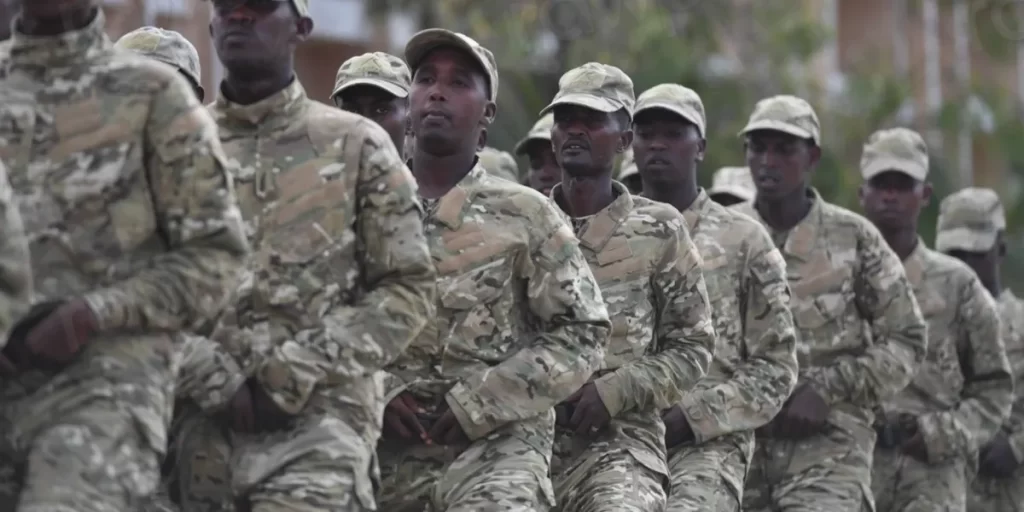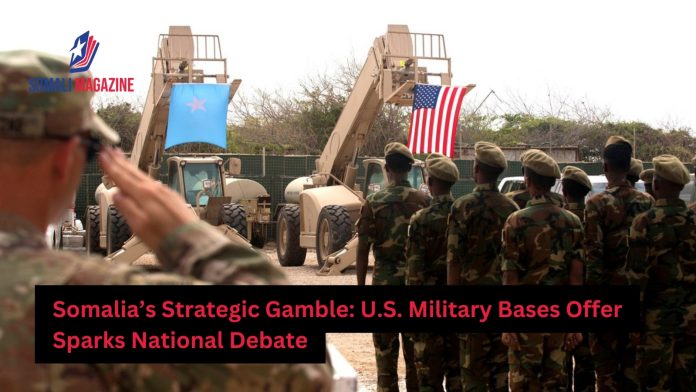Facebook Twitter Instagram Somali Magazine - People's Magazine
Somalia’s reported decision to offer the United States access to strategic military bases has ignited a heated debate across the nation, with citizens and leaders divided over the implications of the move. The proposal, allegedly outlined in a letter from Somali President Hassan Sheikh Mohamud to former U.S. President Donald Trump, includes granting exclusive operational control over key airbases and ports in the Horn of Africa. While some view the offer as a step toward enhancing security and stability, others fear it could exacerbate existing tensions and undermine Somalia’s sovereignty.
The bases in question include Balidogle and Berbera airbases, along with the ports of Berbera and Bosaso. These locations are strategically positioned along critical maritime and logistical corridors, making them valuable assets for counterterrorism operations and regional security. Balidogle, situated northwest of Mogadishu, has long been used by U.S. forces for operations targeting Al-Shabaab militants. Bosaso, located in Puntland, adds complexity to the deal due to Puntland’s semi-autonomous governance structure. Berbera, however, has emerged as the most contentious point, as it lies within Somaliland—a self-declared independent state that Somalia does not recognize.
Supporters of the proposal argue that granting the U.S. access to these bases could bolster Somalia’s security capabilities and strengthen its partnership with Washington. Proponents highlight the potential benefits of increased U.S. engagement in the region, including enhanced counterterrorism efforts and deterrence against external competitors such as China and Russia. “This is an opportunity to solidify our relationship with a global power and ensure stability in the Horn of Africa,” said a senior government official who spoke on condition of anonymity.
Critics, however, have raised concerns about the potential destabilizing effects of the deal. Opposition figures and civil society groups fear that the move could deepen divisions within Somalia, particularly with Somaliland and Puntland, which have their own governance structures and interests. Somaliland’s Foreign Minister Abdirahman Dahir Aden has already condemned the proposal, asserting that Mogadishu has no authority to offer access to Berbera. “The U.S. knows who they need to deal with when it comes to Berbera port,” Aden stated, emphasizing Somaliland’s push for international recognition.
The debate has also sparked broader discussions about Somalia’s sovereignty and the role of foreign powers in its affairs. Critics argue that offering control over strategic assets could undermine Somalia’s state-building efforts and create dependency on external actors. “This is not just about security; it’s about our identity as a nation. We must be cautious about the long-term implications of such agreements,” said a prominent Somali academic.

The reported offer comes at a time when Somalia is navigating complex challenges, including ongoing conflict with Al-Shabaab, political instability, and humanitarian crises. The government’s decision to engage with the U.S. on such a sensitive matter underscores the urgency of addressing these issues, but it also highlights the risks of alienating key stakeholders within the country.
Internationally, the proposal has drawn mixed reactions. While U.S. officials have not publicly commented on the matter, analysts suggest that the deal could strengthen America’s strategic presence in the Horn of Africa, particularly as global powers compete for influence in the region. However, the inclusion of Somaliland’s assets in the offer could complicate U.S.-Somalia relations and spark diplomatic tensions.
As Somalia grapples with the implications of the reported decision, the focus remains on fostering dialogue and building consensus among its diverse political actors. The debate serves as a reminder of the complexities of governance and security in a nation striving to rebuild and assert its sovereignty.

